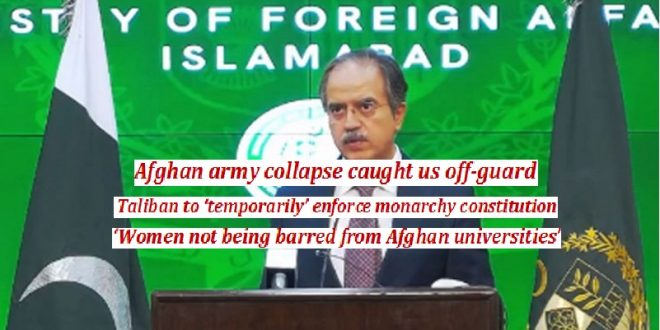30-09-2021
By SJA Jafri + Bureau Report + Agencies
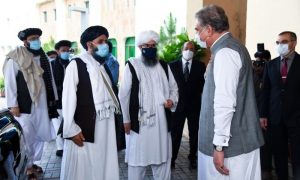 WASHINGTON/ KABUL/ ISLAMABAD: The Foreign Office on Wednesday responded to a draft bill tabled by US senators regarding a probe of the country’s withdrawal from Afghanistan and Pakistan’s alleged support for the Taliban offensive, saying that the proposed legislation is “uncalled for and counterproductive”.
WASHINGTON/ KABUL/ ISLAMABAD: The Foreign Office on Wednesday responded to a draft bill tabled by US senators regarding a probe of the country’s withdrawal from Afghanistan and Pakistan’s alleged support for the Taliban offensive, saying that the proposed legislation is “uncalled for and counterproductive”.
The FO spokesperson, Iftikhar Ahmad, issued a statement in response to media queries regarding Pakistan’s stance on the matter.
“We see that a debate is underway in Washington both in the media and on Capitol Hill to reflect on and examine the circumstances leading to the US withdrawal from Afghanistan. The draft legislation introduced in the US Senate by a group of Senate Republicans seems to be a reaction to this debate,” he said.
The spokesperson said that the legislation “includes references to Pakistan that are completely unwarranted”.
He said that Pakistan finds all such references “inconsistent with the spirit of Pakistan-US cooperation on Afghanistan since 2001, including facilitation of the Afghan peace process and during the recent evacuations of American and other nationals from Afghanistan”.
Ahmed stated for the record that Pakistan has consistently maintained that there is no military solution to the conflict in Afghanistan.
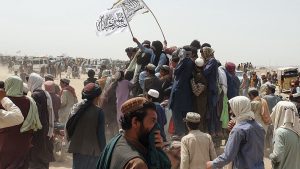 “Similarly, a coercive approach will not work and the only way to achieve long term sustainable peace in Afghanistan is through engagement and dialogue,” he added.
“Similarly, a coercive approach will not work and the only way to achieve long term sustainable peace in Afghanistan is through engagement and dialogue,” he added.
The spokesperson said that sustained security cooperation between Pakistan and the United States would “remain critical in dealing with any future terrorist threat in the region”.
“Such proposed legislative measures are, therefore, uncalled for and counterproductive.”
The proposed bill
American senators have tabled a bill in the US Senate, demanding a deeper investigation into the Taliban’s victory in Afghanistan and sanctions on the group as well as those who assisted them in driving out the Ashraf Ghani-led regime.
The ‘Afghanistan Counterterrorism, Oversight, and Accountability Act’ seeks to establish a task force that will focus on continued evacuation of American citizens, legal permanent residents and Special Immigrant Visa holders from Afghanistan.
Introduced by 22 American Republican senators, the bill seeks to tackle issues related to the Afghan withdrawal, such as counterterrorism strategies and sanctioning the Taliban for alleged human rights abuses in the country.
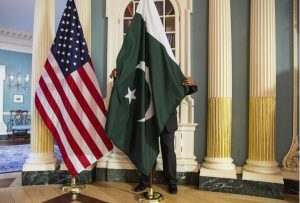 “Not later than 180 days after the date of the enactment of this Act, and not less frequently than annually thereafter, the Secretary of State, in consultation with the Secretary of Defense and the Director of National Intelligence, shall submit to the appropriate congressional committees a report on entities providing support to the Taliban,” the bill read.
“Not later than 180 days after the date of the enactment of this Act, and not less frequently than annually thereafter, the Secretary of State, in consultation with the Secretary of Defense and the Director of National Intelligence, shall submit to the appropriate congressional committees a report on entities providing support to the Taliban,” the bill read.
Non-state actors and Pakistan
It added that further assessment of “support by state and non-state actors, including the Government of Pakistan, for the Taliban between 2001 and 2020, provision of sanctuary space, financial support, intelligence support, logistics and medical support, training, equipping, and tactical, operational, or strategic direction” should be held.
The bill seeks a probe into the “support by state and non-state actors, including the Government of Pakistan” for the 2021 Taliban offensive that helped topple the Afghan government led by Ashraf Ghani, adding that the areas to be probed are provision of sanctuary of space, intelligence support, financial support, logistics, training and medical support for the group.
The bill further seeks a probe into support for the Taliban allegedly by non-state actors and the government of Pakistan into the Panjshir Valley operation by the group and against their military offensives targeting the Afghan resistance.
 “A detailed description of United States diplomatic and military activities undertaken to curtail support for the 2021 offensive of the Taliban that toppled the Government of the Islamic Republic of Afghanistan,” it added.
“A detailed description of United States diplomatic and military activities undertaken to curtail support for the 2021 offensive of the Taliban that toppled the Government of the Islamic Republic of Afghanistan,” it added.
‘This was never our war, Pakistan being scapegoated’
Earlier in the day, Pakistan’s Minister for Human Rights Shireen Mazari lashed out at the American legislators for tabling the bill, saying that once again, Islamabad was being punished for being America’s ally in the War on Terror.
She said despite being in Afghanistan for 20 years, the US government has left behind “no stable governance structures”.
“Pakistan now being scapegoated for this failure.This was never our war; we suffered 80,000 casualties, a dessimated economy, over 450 drone attacks by our US “ally”,” she tweeted.
She asked the US to introspect, wondering whether the massive $2 trillion invested by the US had been spent.
“US Senate should do serious introspection: Where did $2 trillion disappear? Why did the heavily-invested-in ANA simply dissolve? Who asked Pakistan to free TTA (Tehreek-e-Taliban Afghanistan) leadership, who signed Doha agreement with TTA and hosted them in (Washington) DC?”
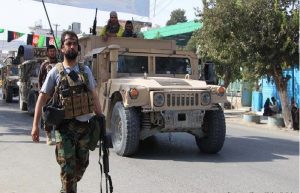 She then urged Western countries to look to their own failures rather than blame Pakistan for them.
She then urged Western countries to look to their own failures rather than blame Pakistan for them.
“Enough is enough. It is time for those powers who were present in Afghanistan to look to their own failures instead of targeting Pakistan which paid a heavy price in lives lost, social & economic costs, refugees, all for being an ally and suffering constant abuse, in a war that wasn’t ours,” she said.
Conversely, the US Defense Secretary Lloyd Austin on Tuesday told the Congress that the Afghan army’s sudden collapse caught the Pentagon off-guard as he acknowledged miscalculations in the longest US-led war including corruption and damaged morale in Afghan ranks.
“The fact that the Afghan army we and our partners trained simply melted away – in many cases without firing a shot took us all by surprise,” Austin told the Senate Armed Services Committee.
“It would be dishonest to claim otherwise.”
Austin was speaking at the start of two days of what are expected to be some of the most contentious hearings in memory over the chaotic end to the war in Afghanistan, which cost the lives of US troops and civilians and left the Taliban back in power.
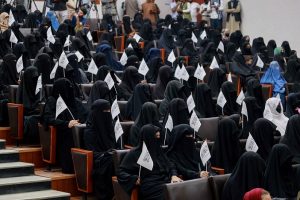 The Senate and House committees overseeing the US military are holding hearings on Tuesday and Wednesday, respectively, and Republicans are hoping to zero in on what they see as mistakes that President Joe Biden’s administration made toward the end of the two-decade-old war.
The Senate and House committees overseeing the US military are holding hearings on Tuesday and Wednesday, respectively, and Republicans are hoping to zero in on what they see as mistakes that President Joe Biden’s administration made toward the end of the two-decade-old war.
The hearings follow similar questioning two weeks ago that saw US Secretary of State Antony Blinken staunchly defending the administration, even as he faced calls for his resignation.
Biden has faced the biggest crisis of his presidency over the dramatic loss of the war in Afghanistan and America’s handling of its troubled withdrawal, raising questions about his judgement and foreign policy expertise.
Senator James Inhofe, the Senate Armed Services Committee’s top Republican, squarely blamed the Biden administration. Inhofe said Biden ignored the recommendations of his military leaders and left many Americans behind after the US withdrawal.
“We all witnessed the horror of the president’s own making,” Inhofe said.
Army General Mark Milley, chairman of the Joint Chiefs of Staff, testified that he did not anticipate the speed of the Taliban takeover but he noted the military’s warnings since late 2020 that an accelerated withdrawal without being tied to any conditions could precipitate the collapse of the Afghan military and government.
 “That was a year ago. My assessment remained consistent throughout,” Milley said.
“That was a year ago. My assessment remained consistent throughout,” Milley said.
Drone strike, suicide bombing
Austin praised American personnel who helped airlift 124,000 Afghans out of the country, an operation that also cost the lives of 13 US troops and scores of Afghans in a suicide bombing outside the Kabul airport.
“Was it perfect? Of course not,” Austin said, noting the desperate Afghans who died trying to climb the side of a US military aircraft and the civilians killed in the last US drone strike of the war.
Milley said the Taliban “remains a terrorist organisation” which has not broken ties with Al Qaeda. He warned that a reconstituted Al Qaeda in Afghanistan with aspirations to attack the United States was “a very real possibility” perhaps in as little as a year.
That warning is likely to unsettle Republican lawmakers, who are skeptical of the Pentagon’s ability keep track of Al Qaeda and Daesh threats, and act quickly on any information it gets.
However, Austin defended the Biden administration’s plans to address future counter-terrorism threats from groups like Al Qaeda and Daesh by flying in drones or commandos from overseas.
 “Over-the-horizon operations are difficult but absolutely possible. And the intelligence that supports them comes from a variety of sources, not just US boots on the ground,” Austin said.
“Over-the-horizon operations are difficult but absolutely possible. And the intelligence that supports them comes from a variety of sources, not just US boots on the ground,” Austin said.
Meanwhile, the Taliban have said that they will “temporarily” enforce a 1964 constitution, granting women the right to vote, but eliminate the elements which they disagree with.
The Taliban’s acting minister for justice issued a statement saying the group planned to introduce a constitution used during Afghanistan’s short-lived golden age of democracy, but only briefly and with amendments.
“The Islamic Emirate will adopt the constitution of the former King Mohammad Zahir Shah’s time for a temporary period”, but anything in the text found to conflict with Sharia law and the principles of the Islamic Emirate would be discarded, Mawlavi Abdul Hakim Sharaee said.
Nearly six decades ago, before the world’s superpowers intervened in the country, Afghanistan enjoyed a brief period of constitutional monarchy during the reign of King Mohammad Zahir Shah.
The king ratified the constitution a year after coming to power in 1963, ushering in nearly a decade of parliamentary democracy before he was overthrown in 1973.
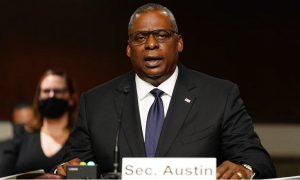 The 1964 constitution, which gave women the right to vote for the first time and opened the doors for their increased participation in politics, would appear an awkward fit with the Taliban’s views.
The 1964 constitution, which gave women the right to vote for the first time and opened the doors for their increased participation in politics, would appear an awkward fit with the Taliban’s views.
The group, which swept to power in mid-August, has vowed a softer and more inclusive approach than during their brutal 1996 to 2001 rule, when women were largely excluded from public life, including work and education but when they presented their caretaker government earlier this month, all the top positions went to men and no women were included.
After suffering through the Soviet occupation in the 1980s, followed by civil war and then harsh Taliban rule, Afghanistan once again adopted a constitution in the aftermath of the US-led 2001 invasion but it opted not to restore the old monarchy, approving instead a fresh text in 2004 that envisaged a presidency and enshrined equal rights for women.
Earlier, the Taliban government in Afghanistan has refuted rumours regarding female students being barred from entering Afghan universities.
In a conversation with Geo News, the Afghan ministry of broadcasting and Kabul University administration officials said there is no restriction on female students attending universities.
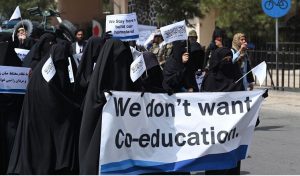 The university administration said that both female students and teachers are attending the university as usual.
The university administration said that both female students and teachers are attending the university as usual.
News of the purported ban on the entrance of women in Afghan universities was published by American newspaper, The New York Times.
“Tightening the Taliban’s restrictions on women, the group’s new chancellor for Kabul University announced on Monday that women would be indefinitely banned from the institution either as instructors or students,” The NYT reported Monday.
The publication cited a tweet by Mohammad Ashraf Ghairat as saying: “I give you my words as chancellor of Kabul University: as long as a real Islamic environment is not provided for all, women will not be allowed to come to universities or work, Islam first.”
However, the Kabul University administration said that The NYT’s report was based on a Tweet posted via a “fake Twitter account”.
“These fake accounts are being used to mislead people with fake news,” the university said.
It added that Ghairat “has no social media account”, and that any information sought must be obtained from the university website.
 Pressmediaofindia
Pressmediaofindia
